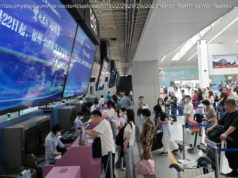Artists and academics in Vancouver are carving out a space to examine both the fate of Hong Kong and the diaspora identity
There is a space occupied by the Hong Kong diaspora and their children in Vancouver, that is neither entirely here nor there. Within that piecemeal identity is a sense of longing – and an increasing sense of responsibility towards the fate of Hong Kong and the broader “Cantosphere”. As next month’s 20th anniversary of the Hong Kong handover closes in, Vancouver’s HK diaspora is looking for ways to highlight an identity that feels under siege. In Hong Hong, the roiling debate over nativism and the Umbrella Movement for political reform have provided an imperative. But in Vancouver, too, there are mounting pressures. There’s the gentrification of Chinatown, and the dilution of Cantonese usage in former bastions such as Richmond’s No 3 Road, where Mandarin usage is rising. Artists and academics alike are finding a sense of purpose. Natalie Tin Yin Gan, 28, was the lead artist on, a dance and multimedia performance that she described as an “urgent celebration for the Cantonese diaspora”. Surreal and dreamlike, the performance by the ensemble cast literal flashing lights on the imperilment of the Cantosphere, and the deep sense of anxiety felt by its occupants. It followed the group’s 2013 dance work, which directly addressed the political and cultural climate in Hong Kong before the handover. But was more personal, rooted in the consciousness of overseas children of Hong Kong immigrants, and the implications of the city’s unfolding fate on an identity built around the Cantonese language. “It was received very differently by audiences, depending on whether they had a connection to Hong Kong diaspora identity, ” said Gan. “For those who did…there is a lot of sadness and isolation in the work. But those who weren’ t aware of that context, they see formal play, humour and a big light show.” For Gan, the identity in question is a construction, but none the less authentic for that. It is built from cinema and TV, childhood visits to Hong Kong and the time-capsuled version of the city that still exists among immigrant parents and grandparents in Vancouver. “Constructed or not, this is a shared experience, and that makes it just as real as anything, ” said Gan, born in Canada to a Hong Kong emigrant mother and Malaysian Chinese father. It’s not a Hong Kong identity though. “There’s a difference between the lived realities of those who were born in Hong Kong and those who were not, ” said Gan. “There is something about that distance and safety that allows us to speak unabashedly, and politically.” There are other efforts in Vancouver to focus attention on the Hong Kong diaspora ahead of the handover anniversary. These include the show at the Vancouver Art Gallery until May 28, featuring work by Hong Kong emigrant artists in Vancouver. The VAG show does not carry the same pulsingly political core that can be read into the work of Hong Kong Exile. But there is a sense of yearning in some of the work, such as the Chinese-style ink landscapes of Carrie Koo. Other art is by David Lam, Paul Chui and Josh Hon. At the same time as the artistic focus has come academic interest, as well as political events including a talk by Hong Kong bookseller Lam Wing-kee this Friday, organised by the Vancouver Hong Kong Forum Society. The by mainland authorities in 2015 and 2016 became a lynchpin event in the history of Hong Kong’s relationship with the mainland. Meanwhile, the University of British Columbia formally launched the Hong Kong Studies Initiative last month, led by historian and self-described “Kowloon kid” Leo Shin. Like the young artists of Hong Kong Exile, Shin, 49, said he sees the Vancouver diaspora as occupying a position of responsibility – in the case of the HKSI, to create a “space outside Hong Kong” to discuss its politics, history and culture. The initiative has three arms: teaching, with a Cantonese-language course at UBC; research, through academic conferences and publications; and community engagement, with the screening of documentaries and the hosting of talks. It does not shy away from tough topics; pitches by speakers at its symposium on April 26 included “Hong Kong culture is said to be dying. Are we dead yet?”, and “I am a citizen, no more, no less”. Shin said there was a need to create a venue for such discussions outside Hong Kong where “the academic space is being squeezed”. A second rationale for the HKSI was that Vancouver and UBC were particularly well positioned to carry out this task, he said, thanks both to the strength of cross-Pacific ties and a simultaneous sense of distance from Hong Kong. The Umbrella Movement and electoral-reform debate in Hong Kong provide context for the HKSI, but also demonstrate its necessity, Shin said, by serving to “expose our ignorance about Hong Kong’s past and present.” “The movement exposed the great deal of diversity [of opinion] in Hong Kong – if you want to put it optimistically. Or division, ” he said. “When people talk about those issues [of Hong Kong ‘nationalism’ and nativism] and ‘shared Hong Kong values’ there is an assumption that everyone knows what they are talking about. It’s done in an offhanded way… There are some assumptions about what those might be. “But I thought that, maybe, we don’ t know. So we should talk about them instead of assuming that we know what we mean.” Shin said the project took no position on any particular version of Hong Kong identity, instead describing the exercise as reflective: “We shouldn’ t, and we are not, advocating for a particular position.” But doesn’ t the project itself invite criticism from an anti-nativist perspective? Shin gave a wry chuckle. “Well, we are not oblivious to this reading. But think about it: UBC has a long history of studying Asia. We have courses on Taiwan. We have courses on Tibet. Just because these are sensitive issues, we are not going to shy away from studying them.” There are potential pitfalls to viewing Hong Kong from afar, both from an artistic and academic perspective. Neither Gan nor Shin are ignorant to these. The most obvious critique: What would you know, being based or born outside Hong Kong, where the issues in question are felt acutely every day? Gan says Room 2048 (and the work of Hong Kong Exile in general) doesn’ t presume to tell Hongkongers how to feel. Instead, it speaks directly to the first-generation overseas experience; the identity at the core of Room 2048 is not one of “authentic Hongkongness but authentic Cantoneseness”. It is an internalised matter. But Hong Kong has always served as a touchstone for young people like Gan seeking answers to their identity – and if Hong Kong’s own identity is under threat, where does that leave Gan and thousands like her? Taken to its extreme, “what I’ m left with is my own broken Cantonese here in Vancouver, in a place where Chinatown itself is disappearing”, said Gan.
Home
United States
USA — China In Vancouver’s ‘Cantosphere’ , a sense of responsibility and an identity under...






